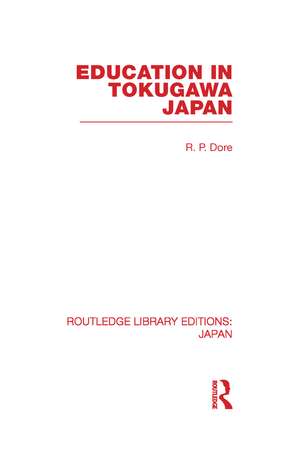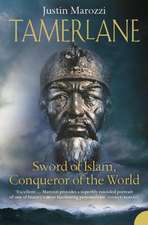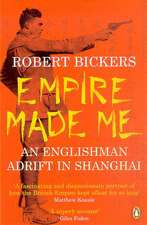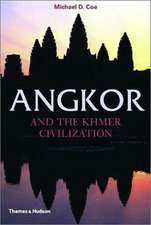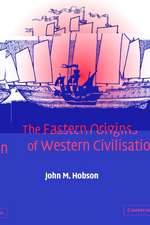Education in Tokugawa Japan: Routledge Library Editions: Japan
Autor Ronald Doreen Limba Engleză Hardback – 8 sep 2010
Din seria Routledge Library Editions: Japan
- 8%
 Preț: 390.79 lei
Preț: 390.79 lei - 37%
 Preț: 623.54 lei
Preț: 623.54 lei - 18%
 Preț: 1057.75 lei
Preț: 1057.75 lei - 18%
 Preț: 776.77 lei
Preț: 776.77 lei - 34%
 Preț: 823.63 lei
Preț: 823.63 lei - 18%
 Preț: 1003.30 lei
Preț: 1003.30 lei - 18%
 Preț: 1058.38 lei
Preț: 1058.38 lei -
 Preț: 358.44 lei
Preț: 358.44 lei - 18%
 Preț: 996.33 lei
Preț: 996.33 lei -
 Preț: 360.15 lei
Preț: 360.15 lei - 18%
 Preț: 1000.51 lei
Preț: 1000.51 lei - 34%
 Preț: 991.70 lei
Preț: 991.70 lei - 36%
 Preț: 824.70 lei
Preț: 824.70 lei - 18%
 Preț: 1055.84 lei
Preț: 1055.84 lei - 18%
 Preț: 1337.57 lei
Preț: 1337.57 lei - 38%
 Preț: 762.72 lei
Preț: 762.72 lei - 34%
 Preț: 765.77 lei
Preț: 765.77 lei - 18%
 Preț: 1057.05 lei
Preț: 1057.05 lei - 35%
 Preț: 994.40 lei
Preț: 994.40 lei - 25%
 Preț: 277.29 lei
Preț: 277.29 lei - 38%
 Preț: 765.40 lei
Preț: 765.40 lei - 34%
 Preț: 992.25 lei
Preț: 992.25 lei - 18%
 Preț: 1288.10 lei
Preț: 1288.10 lei - 34%
 Preț: 823.08 lei
Preț: 823.08 lei - 34%
 Preț: 764.34 lei
Preț: 764.34 lei - 22%
 Preț: 310.05 lei
Preț: 310.05 lei - 18%
 Preț: 1002.60 lei
Preț: 1002.60 lei - 34%
 Preț: 994.40 lei
Preț: 994.40 lei - 18%
 Preț: 1059.84 lei
Preț: 1059.84 lei - 25%
 Preț: 315.28 lei
Preț: 315.28 lei - 34%
 Preț: 822.54 lei
Preț: 822.54 lei - 38%
 Preț: 763.78 lei
Preț: 763.78 lei - 18%
 Preț: 1059.84 lei
Preț: 1059.84 lei - 34%
 Preț: 822.01 lei
Preț: 822.01 lei - 35%
 Preț: 993.32 lei
Preț: 993.32 lei - 34%
 Preț: 990.63 lei
Preț: 990.63 lei - 18%
 Preț: 1061.93 lei
Preț: 1061.93 lei - 36%
 Preț: 822.54 lei
Preț: 822.54 lei - 25%
 Preț: 277.29 lei
Preț: 277.29 lei - 34%
 Preț: 822.01 lei
Preț: 822.01 lei - 18%
 Preț: 1056.80 lei
Preț: 1056.80 lei - 25%
 Preț: 274.25 lei
Preț: 274.25 lei - 36%
 Preț: 851.46 lei
Preț: 851.46 lei - 34%
 Preț: 763.78 lei
Preț: 763.78 lei - 34%
 Preț: 762.72 lei
Preț: 762.72 lei - 18%
 Preț: 1281.56 lei
Preț: 1281.56 lei - 18%
 Preț: 999.46 lei
Preț: 999.46 lei - 18%
 Preț: 1341.36 lei
Preț: 1341.36 lei - 18%
 Preț: 1166.49 lei
Preț: 1166.49 lei
Preț: 994.40 lei
Preț vechi: 1540.52 lei
-35% Nou
Puncte Express: 1492
Preț estimativ în valută:
190.30€ • 197.94$ • 157.11£
190.30€ • 197.94$ • 157.11£
Carte tipărită la comandă
Livrare economică 14-28 aprilie
Preluare comenzi: 021 569.72.76
Specificații
ISBN-13: 9780415587594
ISBN-10: 041558759X
Pagini: 370
Ilustrații: 12 halftones
Dimensiuni: 156 x 234 mm
Greutate: 0.87 kg
Ediția:1
Editura: Taylor & Francis
Colecția Routledge
Seria Routledge Library Editions: Japan
Locul publicării:Oxford, United Kingdom
ISBN-10: 041558759X
Pagini: 370
Ilustrații: 12 halftones
Dimensiuni: 156 x 234 mm
Greutate: 0.87 kg
Ediția:1
Editura: Taylor & Francis
Colecția Routledge
Seria Routledge Library Editions: Japan
Locul publicării:Oxford, United Kingdom
Public țintă
General, Postgraduate, Professional, and UndergraduateCuprins
1. Scholarship and Education: A General Survey of the Period 2. The Aims of Samurai Education in the Tokugawa Period 3. The Fief Schools 4. The Traditional Curriculum 5. Innovations 6. Talent, Training and the Social Order 7. The Commoner and his Masters 8. Terakoya 9. The Content of Terakoya Education 10. The Legacy Appendices Sources Cited Index and Glossary
Descriere
The Japanese society which emerged when Tokugawa Ieyasu had completed the process of pacifying warring baronies was neither literary, nor hardly literate. The Japan of 1868 was a very different society: practically every samurai was literate and it was a world in which books abounded. The transformation which had occurred in these two and a half centuries was an essential precondition for the success of the policy which the leaders of the Meiji Restoration were to adopt. An in-depth survey of the development and education during the period, this book remains one of the key analyses of the effects of Tokugawa educators and education on modern day Japan.
